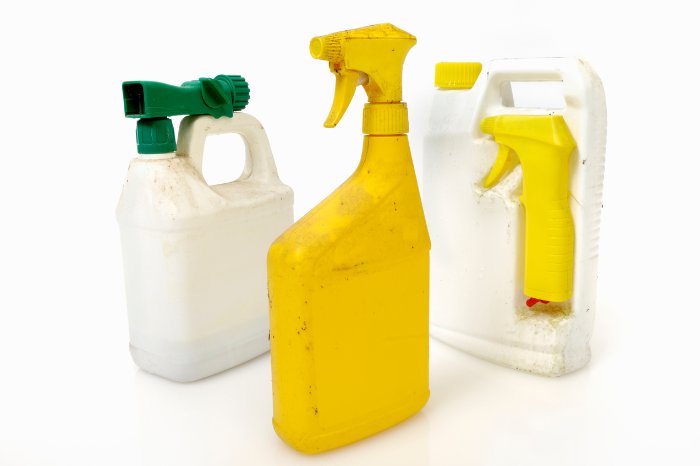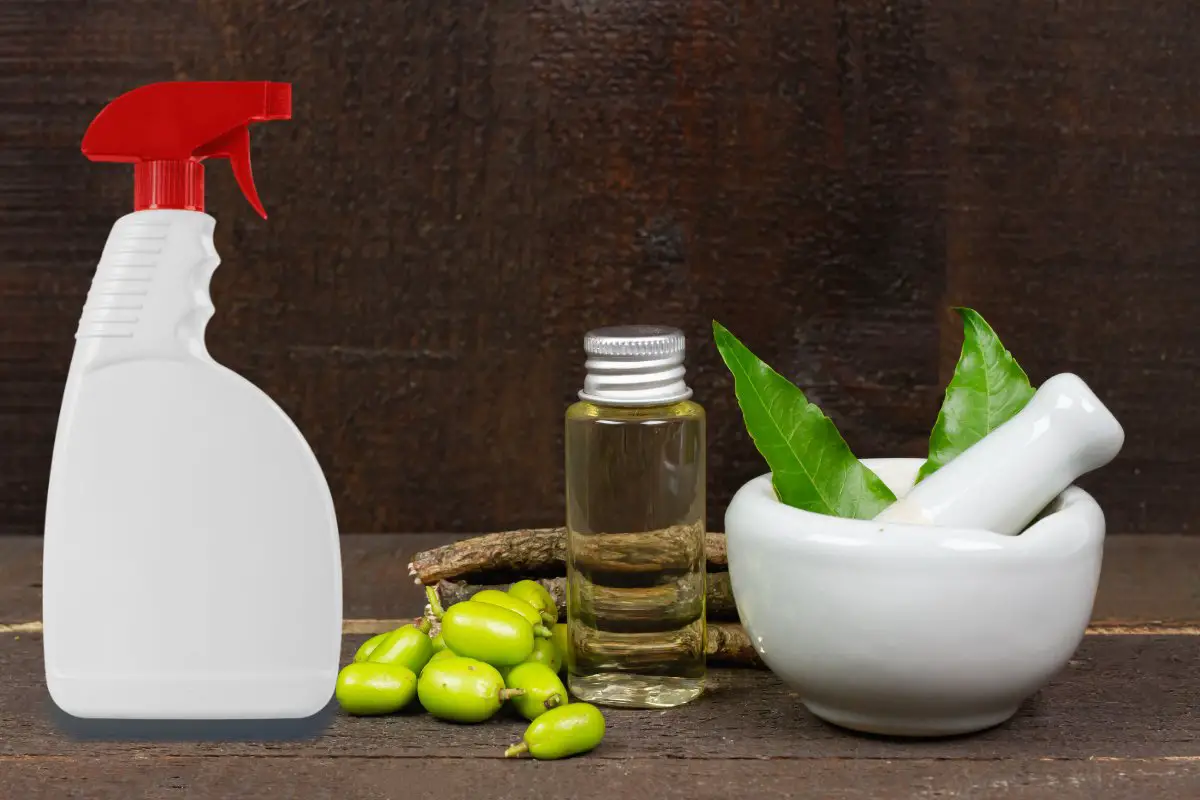Last Updated on December 21, 2022 by Cristina
When evaluating the Neem oil vs insecticidal soap, we must consider that copper is a heavy metal and is present in insecticidal soap, which is in fact toxic in large concentrations. Copper is not biodegradable, but it does wash out of the soil – becoming somebody else’s problem. Neem oil is a biodegradable compound with inhibitory effects on insects and fungi and at sensible concentrations, has little effect on humans. Let’s have a logical look at this topic and help you decide which works for you.
What Is Insecticidal Soap?
Soap is made by reacting fats with alkalis to produce soap and glycerine. If we use a potassium alkali we get liquid soap, and a sodium alkali, we get solid soap. The result is that fatty acids – long-chain organic acids are now reacted with a sodium or potassium ion. If we had the fat octanoic acid, for example, we can swap that out and create a copper soap where either of the ionized forms of copper is reacted with the octanoic acid soap so that the copper ions are bioavailable. Copper is one of those metals that lifeforms need in very small amounts – if there is too much copper it tends to be toxic and kill through a number of different mechanisms.
Copper soap (copper octanoate) is allowed in organic farming as long as the amount of copper used is below a specific mass. The reason for this is to prevent the amount of copper in the soil from reaching levels where it would actually be considered a heavy metal problem. Copper is in fact a pollutant and is toxic to humans in anything above the smallest doses. There is a lesson in there somewhere when we compare neem oil vs insecticidal soap.

What Is Neem Oil?
Neem oil is the extract of the seeds of the neem tree (Azadirachta indica). It contains numerous oils and essential oils, a number of which are biologically active against insects, mites, and fungi. The best studied of these is Azadirachtin which inhibits the feeding of insects and mites and also inhibits the efficacy of an enzyme needed to allow the target insects to molt – this means they cannot grow as they cannot get out of their skin.
Neem oil also has antifungal properties. It breaks down quite rapidly in sunlight and has relatively low toxicity to humans. It tastes pretty bitter and unpleasant, hence it is actually difficult to eat enough of it to hurt yourself even slightly. Neem oil does not accumulate over time in the soil or environment and it is not a pollutant as it is biodegradable. This is important to keep in mind when we compare neem oil vs insecticidal soap.
You Might Want to Read these Related Articles:
- Is Neem Oil Safe To Eat? Make Your Food Organic – And Safe!
- Can You Use Neem Oil On Lettuce As A Pesticide?
Neem Oil Vs Insecticidal Soap
We have just had a look at copper soap and neem oil and can now run a comparison of neem oil vs insecticidal soap:
- Fungal control – both neem oil and copper soap help to control fungal infections. Neem oil is probably slightly less effective but is also unlikely to leave long-term harmful residues in your crop or soil. Copper insecticidal soap is toxic, and if used heavily will pollute your soil, and leave residues in your food.
- Insect control – both are effective against insects. Neem oil is in my opinion more effective on average and is less toxic. Neem oil controls insects, and contributes no long-term residues in your food or soil – copper insecticidal soap leaves residues and builds up in your soil. It is toxic.
- Mite control – Neem oil is more effective, and less likely to cause any problems.
On a general balance, I would try to use neem oil more than copper insecticidal soap – there are a few places where insecticidal soap really works well – powdery mildew for example is controlled well with this product. Generally, my principle is always to choose the least toxic treatment for the main treatments, allowing you to occasionally use a more toxic treatment when needed. Copper, in low concentrations, is really good for soil – in high concentrations, it is really bad. So, the less you use it, the more likely you are doing something good!!
HARRIS Neem Oil Cold Pressed Water Soluble Concentrate, Makes 12 Gallons
Can You Mix Neem Oil With Insecticidal Soap?
You probably can, but copper is a very active ion, and it would react with neem oil components, so to me, I would probably avoid that. I work in the field of fats and ionic chemistry, and when I see copper and organic oils and soaps mixed together I immediately start seeing the potential for complex varnishes and polymers to develop that would render much of your copper and much of your neem oil useless.
Personally, I would suggest that there will most likely be a lot of people out there who will tell you that you can mix the two. I have done a cursory search of the internet and see that there are many people from some that are quite qualified to have opinions, to some who just have opinions and suggest that to a lesser or greater degree you can mix the two. Again, my gut feeling is that with any treatment campaign, it is a good idea to not have treatments that can react with each other mixed together.
Another line of logic is that Neem oil has one mode of action, and insecticidal soap has a different mode of action. If you mix the two together, your pests are exposed to the mix every time and will evolve resistance to this – on the other hand, if you alternate treatments, the rate at which pests evolve resistance, if they ever do, will be lower.
The third line of logic is that by mixing the two together you will make both less effective – and then expose pests to a less effective mix. This also breeds resistance to both treatments.
Logically – in the Neem Oil Vs Insecticidal Soap debate, I would suggest treating often with neem, and very occasionally with insecticidal soap, and keeping the treatments very separate.
Take Out Time to Also Read:
How To Make Insecticidal Soap With Neem Oil
Read the previous paragraph and you will see why my advice, as a scientist and a user of logic, would be to not mix the two. The chemistry of the two products will fight, and make both a lower quality product. Terpene family chemicals are very reactive – this is why they are effective at changing things and killing things – and copper is also very catalytic – mixing the two just seems like a bad idea.
When comparing the benefits of neem oil vs insecticidal soap it is clear that they have overlapping effectiveness, but different modes of action – it is always good to keep classes of treatments with these properties apart. If you treat with neem oil twice in a row, and once with copper a few weeks later, this will be more effective than treating with both at the same time where there is a good chance they will cancel each other out a bit.
In Conclusion – Neem Oil Vs Insecticidal Soap
In comparing neem oil vs insecticidal soap it is clear that the two have different properties. Neem oil breaks down rapidly and has no long-term effects on you, or the soil if used with a level of common sense. Insecticidal soap – which contains copper – is on the other hand non-toxic at low doses and very toxic at high doses.
Copper ions of both charges are toxic ions in large concentrations, and the last thing you want to do is to build up toxic levels of copper in your soil, or yourself. Both have poor outcomes. I would not recommend mixing the two, as they have competing chemistry, and will fight with each other. I would rather suggest alternating treatments if need be, and maybe having more neem treatments than copper treatments. This should keep your soil healthy for as long as possible.
Dr. Garth A. Cambray is a Canadian/South African entrepreneur and beekeeper with 28 years of experience in apiculture and specializes in adding value to honey. His Ph.D. research developed a new advanced continuous fermentation method for making mead that has resulted in a number of companies globally being able to access markets for mead. His company, Makana Meadery, exports honey mead to the USA where it is available to discerning connoisseurs. He has also developed technologies to commercially manufacture organic honey vinegar in Zambia for export globally. He holds a few patents globally in the ethanol industry and believes in technology and knowledge transfer for human development and environmental sustainability. One of his proudest achievements is the fact that the wind farm he started at one of his old apiary sites has essentially made his hometown carbon neutral.



